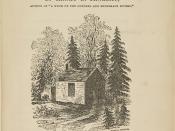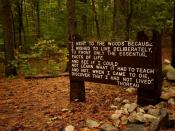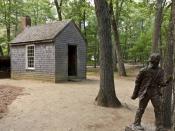On July 4th, 1845, Henry David Thoreau moved into his newly-completed wooden house by Walden Pond. During his two-year experiment in natural living, Thoreau contemplated the benefits of a simple, self-reliant lifestyle in nature. He set out to explore this simplicity and immerse himself in it. Upon his return, Thoreau began work on his walk, Walden, in which he explores the theme of simplicity and how a pure, natural lifestyle without extravagance is an asset man should pursue.
In the chapter, "Economy," Thoreau discusses man's wasteful possessions and their uselessness. Thoreau writes, "Darwin, the naturalist, says of the inhabitants of Tierra del Fuego, that while his own party, who were well clothed and sitting close to a fire, were far from too warm, these naked savages, who were farther off, we observed, to his great surprise, 'to be streaming with perspiration at undergoing such a roasting'" (13). Thoreau challenges the needfulness of modern man with a simple observation in nature: man has no need to be wasteful in his possessions.
While the savages observed by Darwin do not have the "normal" possessions Darwin's party have, they are easily content with themselves as they are, ignorant of the wasteful ways of their "modern" contemporaries; Thoreau uses this irony to show how the "advanced" man happens to be more dependent upon the unnecessary than the simple men he would consider to be below him. This observation is part of the underlying theme of simplicity present in Walden.
In the chapter, "Solitude," Thoreau offers a cure for losing sync with nature and shows how natural simplicity has kept him complacent in his days by Walden Pond. He writes,"What is the pill which will keep us well, serene, contented? . . . Let me have a draught of undiluted morning air .



Great structure
I liked the structure of this essay and how the quotes were weaved in. Well done.
0 out of 0 people found this comment useful.